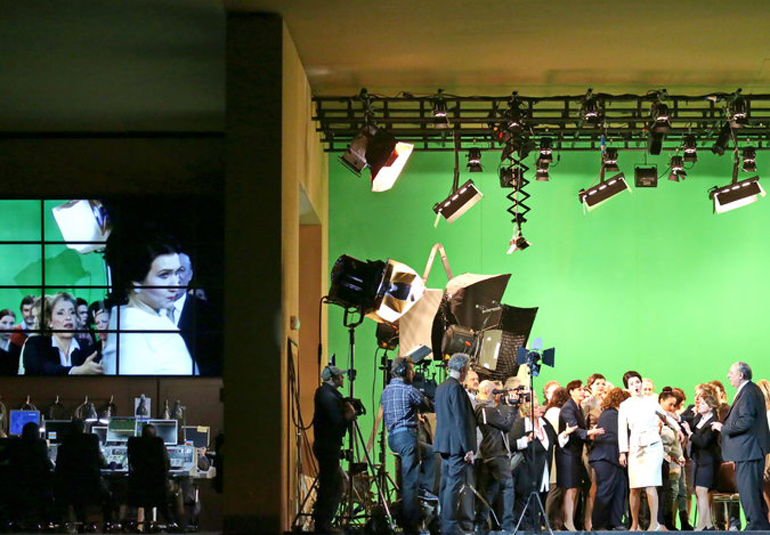
Rimsky-Korsakov: The Tsar’s Bride. Olga Peretyatko (Marfa); Anita Rachvelishvili (Lyubasha); Johannes Martin Kränzle (Gryaznoy); Anna Tomova-Sintow (Saburova). Staatskapelle Berlin/Daniel Barenboim. Stage Director: Dmitri Tcherniakov. BelAir DVD BAC 105. Total Time: 152:00.
Two of Rimsky-Korsakov’s symphonic works – Scheherazade and Capriccio Espagnole – have become classics. But his operas (he wrote 16 of them) are scarcely known at all outside Russia. This splendid new recording might well prompt renewed interest in this neglected repertoire. The Tsar’s Bride (1899) contains some of the most beautiful and powerful music that Rimsky-Korsakov ever wrote. The role of Marfa, with a lovely aria in Act 2 and a vivid mad scene in Act 4, is a tremendous vehicle for any soprano. This performance, recorded at the Berlin Staatsoper in 2013, features a magnificent realization of Marfa by soprano Olga Peretyatko.
The story on which the opera is based can be traced back to the life of Sixteenth Century Tsar, Ivan the Terrible. This Tsar married a commoner selected from twelve finalists, an unfortunate young woman who died under mysterious circumstances just a few days after the wedding. Dramatist Lev Mey crafted a play (1849) based on these facts, to which composer Rimsky-Korsakov and Ilya Tyumenev added their own embellishments 50 years later.
In this joint Berlin Staatsoper-La Scala production, the plot is given a contemporary treatment that adds yet another dimension to the original. In my opinion, Dimitri Tcherniakov’s production is neither a plausible interpretation of the original opera nor particularly insightful in its own right.
The “oprichniks” (secret police) of the original play have been replaced by television network executives. In Tcherniakov’s version of this opera, these TV executives determine what is “real” and use technology to control people’s lives. During the Overture, we see how the media is being used to create an ideal tsar who is pure fiction. Then a contest is organized to choose a bride for the new tsar. From thousands of girls in the initial round-up, the field is reduced to twelve. Complications arise as we learn that Marfa, the girl who will ultimately be chosen, already has a fiancé and that Gryaznoy, one of the TV executives, is also madly in love with her. Gryaznoy also has to deal with Lyubasha, a girl he rejected, who can’t take no for an answer.
In spite of the modernity of the story, at least in the Tcherniakov version, there are magic potions involved, harking back to classic tales such as Romeo and Juliet and Tristan and Isolde.
Gryaznoy gives Marfa what he thinks is a potion that will make her fall in love with him but which is instead a poison prepared by Lyubasha, who has planned to murder her. The poison drives Marfa mad, and ultimately she dies.
Tcherniakov’s ‘made for TV’ version of the opera is awkwardly grafted onto the original story. The sets seem obsessively claustrophobic – in several scenes we are looking through windows at characters crammed into small rooms. The characters, in general, are “ smaller than life”. “Why,” one might ask; “What is the point?”
While our credulity is severely tested in this story, the opera is nonetheless a gripping experience, especially with such a fine cast and with Barenboim drawing expressive and powerful playing from his orchestra.
Heading the cast, as Marfa, is Olga Peretyako, whose uncommonly beautiful voice soars in the ensembles. In the mad scene at the end of the opera, her characterization is touching and harrowing at the same time, calling to mind Ophelia or Desdemona.
Johannes Martin Kränzle as Grigory Gryaznoy makes a thoroughly convincing villain, a man who wants what he wants no matter the consequences. But was it Tcherniakov who directed his character to be constantly drinking ‘mead’ or honey wine, an alcoholic drink popular in Nineteenth Century Russia? We get the idea after the first dozen glasses, but his drinking continues to the point of absurdity, a cartoonish prop used to remind us that this character is out of control. Case in point: in the last scene of the opera, Gryaznoy makes a sudden confession. A little abrupt, Kränzle nevertheless carries it off with singing of tremendous intensity.
The greatest and well-deserved ovation at the end of this live performance went to Anita Rachvelishvili, a mezzo-soprano with a commanding stage presence and a rich and powerful voice, Toronto audiences may recall her appearances in the title role of Carmen with the Canadian Opera Company (COC) a few years back.
Finally, kudos to Anna Tomova-Sintow in the role of Domna Saburova. At 72, Tomova-Sintov, one of Herbert von Karajan’s favourites in the 1970s and 80s, still sings with a remarkable command of phrasing. It was a pleasure to see her in such fine form.
If you have never heard/seen The Tsar’s Bride, I can’t imagine a better introduction to it than this great musical performance, in spite of Dimitri Tcherniakov’s contrived and unconvincing representation of the story.
DVD available via Amazon.com.
#LUDWIGVAN
Want more updates on Toronto-centric classical music news and review before anyone else finds out? Get our exclusive newsletter here and follow us on Facebook or Twitter for all the latest.
- SCRUTINY | TSO Lets Berlioz Do The Talking In Season Opener - September 21, 2018
- RECORD KEEPING | Even Yannick Nézet-Séguin Can’t Make Us Love Mozart’s La Clemenza di Tito - September 6, 2018
- RECORD KEEPING | Giovanna d’Arco With Anna Netrebko Explains Why The Best Operas Survive - August 30, 2018



